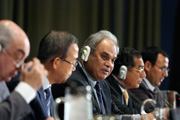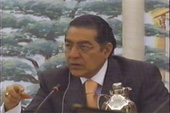 Regarding the announcement by the Government of the United States of new measures further tightening the economic, commercial and financial embargo imposed against the Republic of Cuba, including actions aimed at obstructing the supply of oil to the country and the imposition of sanctions on third States that engage in legitimate commercial relations with Cuba, which have clear extraterritorial effects, the Group stresses that these measures are contrary to the purposes and principles of the Charter of the United Nations and international law, and undermine multilateralism, international economic cooperation and the rules-based, non-discriminatory, open, fair and equitable multilateral trading system with the World Trade Organization at its core. At the same time, they aggravate Cuba's difficulties to carry out financial and commercial operations, threatening the livelihood and integrity of the Cuban population. As stated in successive ministerial declarations of the G77 and China, the Group reaffirms its call upon the Government of the United States to put an end to the economic, commercial and financial embargo imposed on Cuba for more than six decades that constitutes the major impediment for its full development. At the same time, the Group regrets the measures implemented by the Government of the United States since November 9th, 2017, which strengthen the embargo, including the arbitrary inclusion of Cuba in the unilateral list of States that allegedly sponsor terrorism. The Group reaffirms its solidarity with Cuba and calls upon all States to uphold multilateralism, international cooperation and solidarity, and to fully respect international law and the Charter of the United Nations, in order to advance sustainable development, equity and shared prosperity for all. Mr. President, Distinguished Members of the Board, the UNDP Administrator, I have the honor to deliver this statement on behalf of the Group of 77 and China. Once again, we express the full confidence on the leadership of the UNDP Administrator, Mr. Alexander De Croo. The Group reiterates its long-standing position that peace cannot be achieved without sustainable development. At a time of uncertainties and exacerbated global challenges, developing countries depend more than ever on a strong, responsive and adequately resourced United Nations system to ensure that no one is left behind. International cooperation, including South-South cooperation remains a central pillar of the work of the United Nations and is of particular importance to developing countries. The United Nations Office for South-South Cooperation plays a vital role in supporting, coordinating and/or implementing South-South cooperation initiatives across the United Nations development system. Mr. President, We are deeply concerned by the ongoing UN financial challenges resulting, among others, from the non-payment of assessed contributions by Member States, which has forced the Organization to adopt urgent cost-saving measures, as well as reduce its budget and to under execute it. While we recognize the need for efficiency, we must underline that austerity cannot come at the expense of the mandates that developing countries rely upon most. In these circumstances, while we understand that the financial difficulties specifically impacted the design of the United Nations Office for South-South Cooperation's Strategic Framework 2026-2029, presented today to the Executive Board, we believe it is essential to emphasize the need for a balanced approach that safeguards substantially the integrity of both strategic policy and operational functions within UNOSSC. Additionally, the Group values the principle of equitable geographical representation, particularly in this Office that was established, supported, and promoted by the G77 and China. The G77 notes that until last year, the existing model, has delivered concrete and widely recognized results on the ground. Trust Funds, such as the Pérez-Guerrero Trust Fund, established by the United Nations General Assembly resolution 38/201 in 1983, for the purpose of supporting activities in economic and technical cooperation among developing countries members of this Group, exemplify effective South-South and triangular cooperation, prioritizing projects that benefit the most vulnerable populations, being financed and administered by and for developing countries. Therefore, we appreciate UNDP's commitment to maintaining support and ensuring "the fiduciary management" of South-South Cooperation Trust Funds and "interface with the relevant UNDP Country Offices". Despite the current constraints explained, it is crucial to uphold the existing level of support to guarantee the substantive impact of these initiatives in the field. Regarding the concern raised in our letter to the Administrator dated 30 January 2026 over the significant reduction in the resources to be allocated by UNDP to the UN Office on South-South cooperation under the 2026-2029 Strategic Framework, the Group of 77 and China wishes to acknowledge and appreciate the constructive dialogue maintained with the Administrator and his team as well as his reassurances for the continued support to the Trust Funds. We appreciate the response given and the willingness to engage further with the G77 and China regarding the implementation approach of the Strategic Framework, including the proposal to develop "implementation arrangements" that incorporate our feedback. The Group of 77 and China thanks you and reaffirms its readiness to continue engaging constructively in order to improve the coherence and effectiveness in the UN system as a whole. Thank you, Mr/Madam Moderator. I have the honor to speak on behalf of the Group of 77 and China. From the onset, I wish to thank the panelists for their insightful and thought-provoking contributions to this interactive dialogue. The Group of 77 and China underscores that enhancing enforcement capacities and improving the effective use of information and data are critical to combating illicit financial flows, corruption, tax evasion, money laundering and related crimes that undermine sustainable development. Despite increased availability of domestic and cross-border data, many developing countries continue to face significant capacity gaps in effectively using this information for enforcement purposes. These gaps include limited human and technical capacities, inadequate digital infrastructure, fragmented and non-interoperable data systems, and constraints in accessing in a timely manner , high-quality information from international partners. Legal and institutional limitations further impede the use of data in investigations, prosecutions and judicial proceedings. The Group emphasizes the importance of strengthening the full enforcement chain, including investigative, forensic accounting, prosecutorial and judicial capacities. Such strengthening requires the sharing of best practices and the maintenance of open communication channels between the public and private sectors, as well as supporting gradual and sustainable implementation paths that take into account different levels of development and institutional capacities. It also requires sustained investment in training, institutional development, and the retention of specialized expertise. While innovative tools-such as AI-enabled analytics, asset tracing, and digital forensics-can significantly enhance effectiveness, they must be paired with technology transfer and capacity-building for developing countries. Furthermore, these tools require robust safeguards to ensure transparency, accountability, and respect for human rights. To avoid placing undue burdens on resource-constrained countries, the Group emphasizes the need for flexible transition periods to ensure that expanded data-sharing respects confidentiality, national legal frameworks, and data sovereignty, while fully upholding due process guarantees and the rule of law. The Group highlights the need for integrated and coordinated approaches among tax authorities, financial intelligence units, customs administrations, anti-corruption agencies and law enforcement bodies. Strengthening inter-agency cooperation, establishing clear legal mandates for information-sharing, including the exchange of tax-related data on digital assets to address emerging risks associated with the digital economy, and improving data interoperability through common standards and secure platforms are essential to maximizing the value of available data. National coordination efforts should be reinforced by effective international cooperation mechanisms. We look forward to the implementation of paragraph 28(g) of the Compromiso de Sevilla. To participate fully and effectively in global data-sharing arrangements, developing countries require access to additional, high-quality data as well as sustained support. Capacity-building, technical assistance, technology transfer, and infrastructure development must be predictable, long-term, and aligned with national priorities. Standard-setting bodies and international organizations should enhance coordination among themselves, avoid duplication of efforts, and ensure that support is predictable, long-term and demand-driven. Developing countries must be meaningfully involved in the design, implementation and evaluation of capacity-building initiatives. The Group stresses that strengthening enforcement capacities and the effective use of information and data should directly support the identification, tracing, freezing, confiscation and recovery of illicit assets, in accordance with the United Nations Convention against Corruption and other relevant international instruments. Asset recovery and repatriation remain a fundamental component of international cooperation, contributing to justice, accountability and the return of resources to support sustainable development in developing countries. The Group is also gravely concerned by the harmful effects of unilateral coercive economic measures on the endeavors of developing countries to realize the objectives of the 2030 Agenda. Immediate action is imperative to eradicate these measures and rectify imbalances within international financial institutions. Such actions defy the principles of the UN Charter and international law, posing threats to trade and investment freedoms. Mr/Madam Moderator, In conclusion, the Group of 77 and China reaffirms its commitment to strengthening enforcement capacities and promoting innovation in the use of information and data. However, these efforts must correct existing imbalances, ensure meaningful participation, and place development and equity at their core. Addressing capacity gaps, improving access to appropriate technologies, and strengthening legal and institutional frameworks are essential to ensuring that data serves as an effective tool for justice, accountability and sustainable development. Thank you. 31st Annual Meeting of Ministers for Foreign Affairs (27 September 2007)
Press Briefing by G-77 Chairman at the 41st G-77 Chapters Meeting (26-27 February 2007)
Press Conference by G-77 Chairman on G-77 Agenda and UN Reform (20 February 2007)
|
|||||||

 Print
Print
 RealPlayer
RealPlayer


